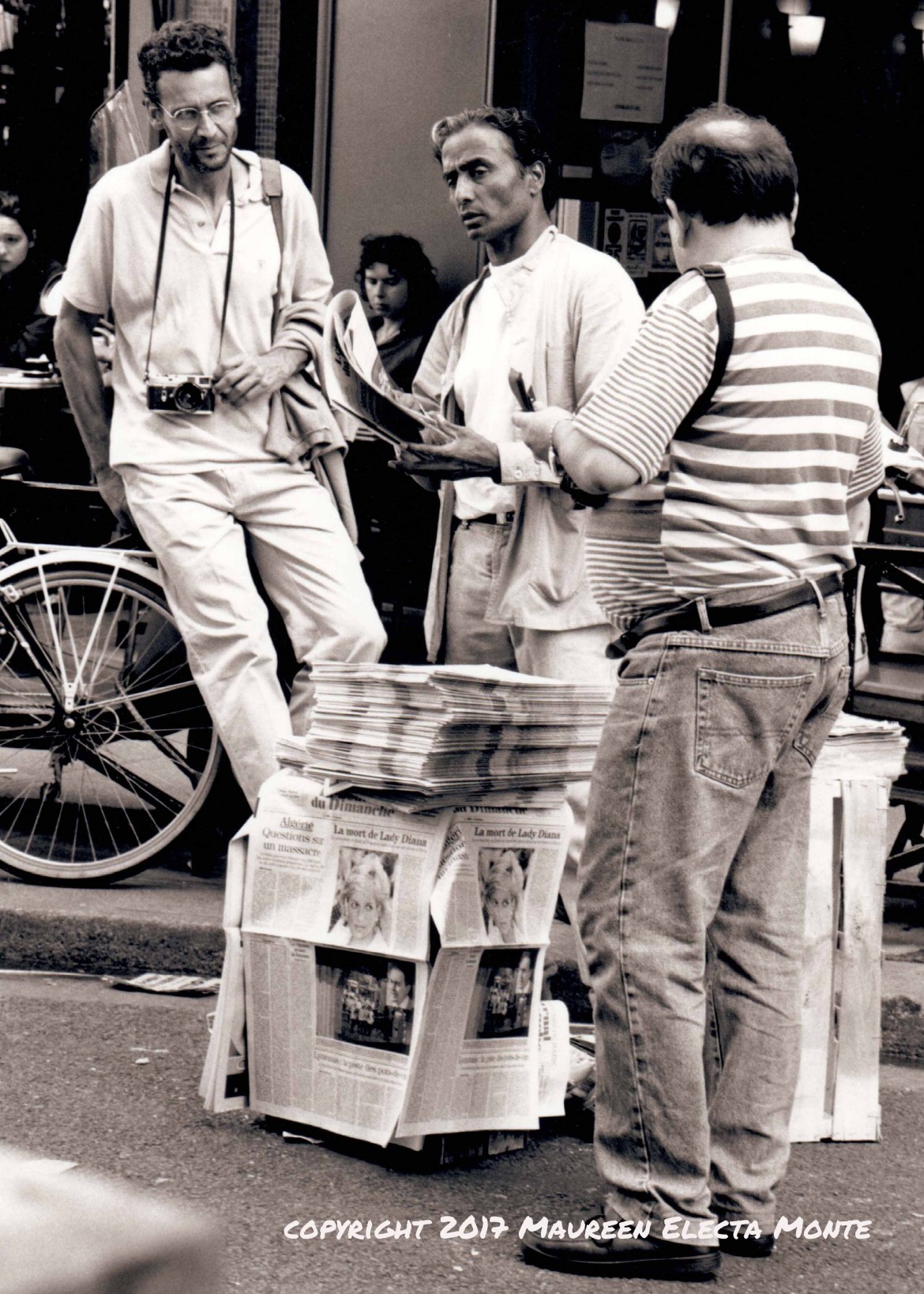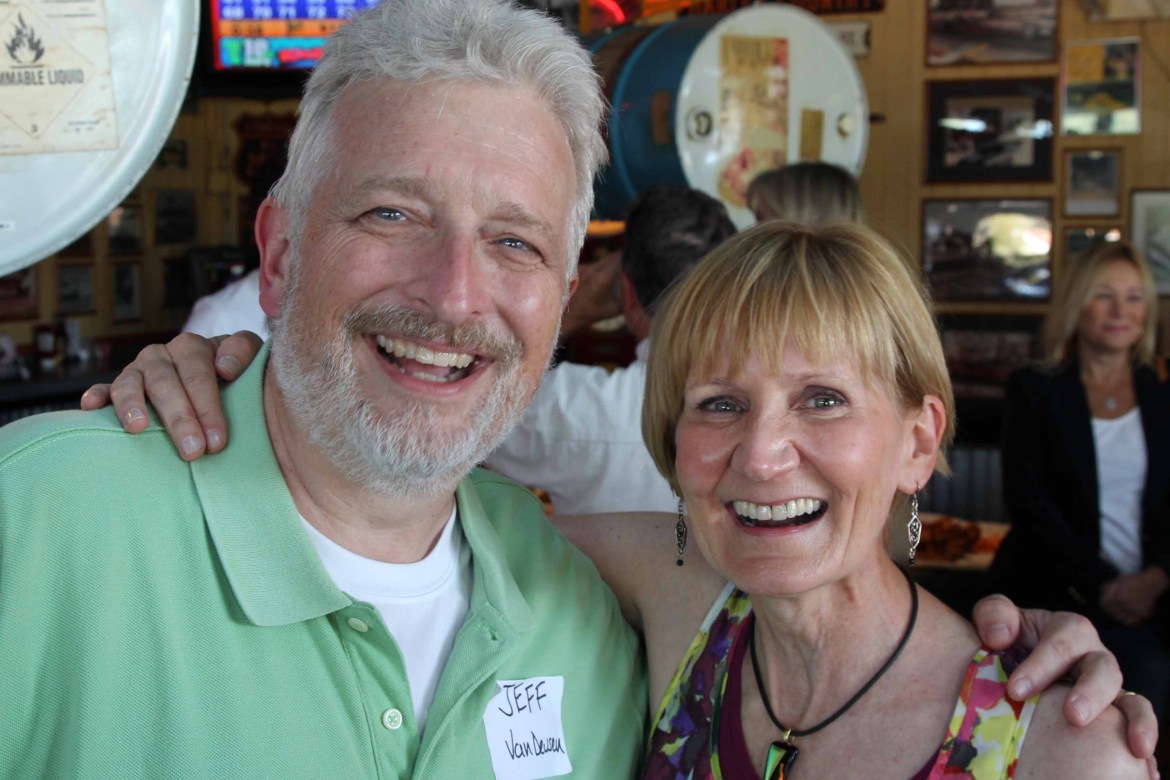I was in Paris when Lady Diana was killed. And while this story is not about me, I must share that I had an instant sense of kindship with her two boys because my father died when I was eleven. Millions watched while William and Harry trudged sadly behind Diana’s flag-draped caisson, their chins lowered, pointing at their tiny broken hearts. I knew how hard their life would be without the love of a parent.
I learned about Diana’s death just like everyone else: from the press. I was in a busy square in Paris when a man arrived, shouting and waving newspapers. He dropped a small, portable table, and began to sell papers like hotcakes. French people babbled in French. On the front of the paper was a photo of Diana. I caught a glimpse of the headline in French, which read, “The Death of Lady Diana.” Funny, I didn’t take it literally. I was vaguely aware she was dating a rich man and that there was scandal (there is always scandal!) I just assumed that the headline meant their relationship had died. I was more interested in the unusual face of the man selling the papers than his message, and I eventually snapped this shot of him.

It wasn’t until I read the headlines the next morning, in English, that I understood. I visited the bridge where she died. There were mountains of flowers around the fire of freedom monument on Pont de l’Alma (The Alma Bridge). How apropos for Diana to die beneath an eternal flame. It is a life-sized replica of the same flame that dons our beautiful Statue of Liberty.

THE MYSTERIOUS COACH
Fast forward 20 years later to the anniversary of Diana’s death. I watched a documentary on PBS about Diana. I thought I’d seen it all, knew it all. Here is what I didn’t know: she had a coach. A coach to help her speak publicly. As part of his program, he filmed her reading speeches and other documents. He had no problem interrupting and injecting firm but gentle corrections. He gave her no quarter. Speak louder. Slow down. Enunciate. She would stop, give him “that look”, and try again. He said, “People need to hear your voice. You have important things to say.” She appeared flustered and unsure. But she didn’t quit.
Sometimes he let the camera run while she lowered her guard. The film from is not in interview form. It’s a conversation between two people who cared about and trusted one another. Diana revealed stories of her past. “We only met 13 times before we were engaged!” Diana said with an exaggerated grimace. “Who does that?” she added in self-effacing disbelief.
DIRE STRAITS
The real gift of their kinship emerged when Diana, tucked up on a couch, described going to the Queen and requesting her influence against Charles’ philandering. As Diana described how difficult her life was – public humiliation by Charles, a royal family where duties and protocols matter more than love, going to the Queen for help was a desperate last act. Diana shared the Queen’s response to her plea for help. “She said, ‘Charles is hopeless!’ and that was the end of it. At that point,” said Diana, unconsciously moving her hand toward her heart in a protective gesture, “I realized I’d have to cut my own path.” A sheltered problem child rejected by her royal kin, a broken marriage sitting on ice in a gilded palace, and an objected relentlessly pursued by the paparazzi, Diana was on thin emotional ice. Until she wasn’t.
The speech coach became her lifeline, her connection to a better future. Their connection was not grounded in her looks, her money, nor her access to power. The speech coach had one interest: to help Diana find her voice and dig deep for the courage to use it so that she could cut her own path. Buoyed by his belief in her, she flourished in ways previously unimagined. He helped her become fully.
Every time Diana spoke in public about AIDS, landmines in Africa, or other causes she believed in, her voice became stronger and more compelling. She gained visible confidence. The bonds she created with the public increased in depth and breadth. Kinship is contagious because we all long for it. It is a two-way street; this is how Diana became The People’s Princess.
THE POWER OF KINSHIP
I was meeting with sports coaches in Iowa when I found my second example in a USA Today article. It had “Demotion, Kinship with hitting coach” in the headline. The subject of the article was such a prolific problem child that, despite his immense ability, one line in the article read, “For all his abundant talent and youth, Puig became such an unproductive nuisance that the Los Angeles Dodgers looked into trading him last season.” Yasiel Puig. Cuban. Emotional. A wild horse that burst upon the baseball major leagues like a comet in 2013, he had lived like a roller coaster with multiple highs and lows.
Attempts to rein him in were ineffective, and as with most comets, Puig was destructive to those he ran into. Even with stellar statistics and an All-Star performance, Puig remained difficult and often disliked. Eventually, he was injured. His performance dropped. Fans booed him. He had multiple issues off the field. A former teammate called Puig the “worst person to ever play the game.” Another said, “We all know he (Puig) can be a superstar. Can he pull a 180 and be the person we want him to be? Show up on time, is a good teammate to everybody, and produces…” (Good Advice: Show up on time, be a great teammate to everybody, and do your job. Do not be an unproductive nuisance.)
DOSE OF REALITY
Puig was demoted to the minors for a month late last year where he lived an unglamorous lifestyle. Cheap travel on busses. Handful of fans in empty little ball parks. Pre-dawn wakeup calls. There is no glitter or glory in the minor leagues. But the biggest influence in transforming Puig came from a leader who wouldn’t give up on him, hitting coach Turner Ward.
Coach Ward saw that Puig took even the smallest correction as a personal insult and wouldn’t listen (how many problem children are good listeners?) Coach began to get personal with Puig, learning more about his background, his childhood in Cuba, and he took to putting his arm around Puig and giving him a kiss on the cheek during batting practice. This physical, playful approach to the proud Puig began to have an impact, especially when he returned from the minor leagues. Puig became less sensitive, more relaxed, and his performance began to improve. Now, when he helps the team win, something he’s been doing a lot lately, Puig kisses Ward on the cheek. His teammates are behind him and with him. The same folks that wanted him gone last year are glad to have him this year.

It wasn’t the increase in talent that helped Puig turn the corner. It was the increase of kinship. The connections between Puig, his coaches, his teammates, and his fans is deepening. If he remains on the same path, it is likely to continue. Like Diana, Puig is becoming fully because he was forced to (reality has that affect sometimes!) Regulating his strengths, placing the “we” before “me”, and valuing others for being valuable. He’s pulling that 180 that his teammate was hoping for. If that journey sounds familiar, it should. That’s the story of my book, Destination Unstoppable.
On Sunday, the Los Angeles Dodgers ended the season with the best record in baseball. Puig played a role in the team’s success.
SAYING THANK YOU
The powerful combination of kinship and coaching cannot be underestimated. We all need it, and we need it even more in these difficult times. We must be open to kinship opportunities because sometimes we find it in the darndest places and in the darndest ways. Offering kinship can be transformational. It requires patience, subject matter expertise, and valuing others for the unique and special people they are. The unique and special people we all are. If there is someone in your life who gives you the gift of kinship, maybe today is the perfect day to thank them.

I’ll go first. I’m going to thank Jeff VanDeusen, whose kinship and coaching means more to me than he will ever know. My nick name for him is Brother Love, taken from Neil Diamond’s song off the live album Hot August Night. Jeff used his immense social talent to help me organize my Destination Unstoppable book launch party just over a year ago, and he took marvelous photos of attendees. It was a Hot August Night, then, too. We meet every now and again, share a cold beer (he’s a beer connoisseur) and solve all the world’s problems. He lifts my spirits and helps me believe in my journey. He’s one of the least judgmental people I have ever met. Thank you for your immense time and talent, Brother Love. See you soon!
Maureen (Ideation | Strategic | Learner | Achiever | Individualization | Maximizer)


Vicki Flaherty
Maureen, I loved this post. There’s something very special about someone who cares deeply enough about you that they will show you the things you can’t see, present different perspectives and new ideas – even the ones that might be most challenging for you to accept. There’s nothing like having someone in your court who is 100% about you showing up at your best. I remember learning in Radical Leadership that sometimes the best thing you can do for someone is hold up the hard truth, and do it in a way that gets the person’s attention. Thank you for being an amazing coach role model, my friend!
Maureen Monte
Hi Vicki, thanks so much for taking time to comment and add additional insight! Yes, there are times when either the message or the messenger are tough to accept. But we all need those outside eyes helping us achieve our full potential. There’s a great quote from Doc Rivers, a basket ball coach, who said, “Average players want to be left alone. Good players want to be coached. Great players want to be told the truth.” And I think we can move from one state to the other with success, experience, and someone who believes in us! Thank you for your kind words. Onward!